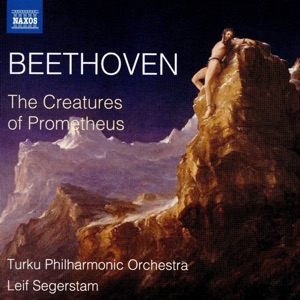The Creatures of Prometheus is a much better piece than its reputation would suggest. Beethoven took the project seriously, and scored the piece voluptuously. Indeed, the Adagio in Act 2 for harp with solo cello sounds almost like Tchaikovsky, especially in this uber-romantic performance. The lively overture, of course, is familiar, but the ensuing storm foreshadows that in the Pastoral Symphony, and we all know that the work concludes with the tune that served as the basis for the finale of the Eroica (symphony and piano variations). In short, there’s lots of good music here in what is, after all, Beethoven’s longest purely orchestral score.
Most performances of the work last somewhere between 65 and 70 minutes. Leif Segerstam stretches that out to a generous 76, but the performance doesn’t sound especially slow. The reason stems partly from his loving handling of phrasing, but also because the slower tempos in the strongly rhythmic quick music only serve to make it sound more danceable as compared to swifter, more “abstract” versions. Certainly the Turku Philharmonic plays quite well, and the sonics, a bit dry, are clean and clear. I assume that this disc will become part of Naxos’ soon-to-be issued complete Beethoven edition, but if you don’t want to wait and need a warm and lovable version of Prometheus, you should consider this.
































